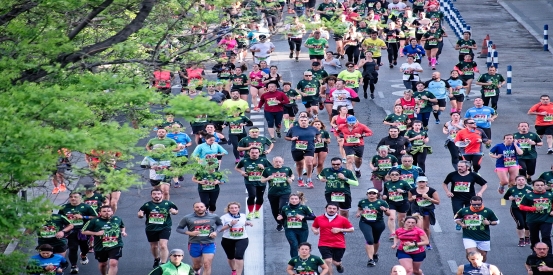If you are planning to take part in a marathon then it is important to create a training plan. Ideally, a training schedule should cover at least 16 weeks so as to reduce the risk of injury and ensure that you are physically and mentally ready to run 26.2 miles. However you can start as early as you want!
Get a routine
The first few weeks are all about getting your body into a running routine. You may already be very active, but your muscles need to become used to running several times a week. To achieve this you should start off by trying to go for a gentle run about two or three times a week with a long run once a week. Don't worry about your speed at this point, just try to keep moving for the whole distance and gradually increase the length of your long runs. It can be easy to feel the urge to push yourself to extremes when training, but it is vital that you listen to your body and build up your capabilities in a realistic and gradual way.
Don’t feel tempted to try and exercise every day, this will exhaust your body and increase your chance of causing an injury. It is important that throughout your entire training, you have at least two days of rest a week as this allows your muscles time to repair and strengthen.
Weeks 4-6
Now that your body is comfortable with frequent running you should ensure that your long runs take you over an hour. You should also now introduce HIIT into your workouts. HIIT stands for high-intensity intervals; this basically means that you should vary between running very fast and at a standard speed. This type of workout is hard but it will improve your aerobic fitness, speed and metabolism. One example of a HIIT exercise that you can introduce into your training is warming up with a ten-minute jog, and then sprinting for two minutes, followed by a two-minute jog. You would then repeat this about six times and finished with a ten-minute jog cool down.
Remember that it’s important to stretch before and after every workout, it may seem boring but hold each stretch for approximately 30 seconds.
Weeks 7-10
This is the halfway point in your training, so you should now aim to complete a ten-mile run. Just as at the beginning of your training, process it is more important to focus more on running the whole distance as opposed to trying to get a great time.
Weeks 11-13
There are lots of 10km or half marathons happening all year round, and these are great opportunities for you to practise running in a race environment. You should enter at least one race, preferably about 3-4 weeks before the final day, and use it as a dress rehearsal for the real day. This means you should eat the same food the night before, wear the same clothes and get up at the same time. It is a great opportunity to see if these conditions are correct for the marathon day, for example, you might find that your clothes are too baggy and slow you down.
Week 13 also marks the point at which you should complete the longest run of your training. This is because in the last few weeks, you will begin to reduce your running distances so by week 13 you need to have run at least 20 miles.
Weeks 14-16
After your 20-mile run, you will begin to reduce your running distances gradually; this is designed to give your body some recovery and preparation time whilst allowing you to maintain the gains that you have made over the last few weeks. This is also a good time to look back at your progress and set yourself a goal or milestone for the big day. For example, if you know that, on average, you run a ten-minute mile, then aim to complete ten miles in 100 minutes. Having a milestone like this will help to keep you mentally focused during the race.
Take the very last week easy, don't do anything that could cause injury and have lots of rest in order to save energy for the big day.
Finally, good luck!
